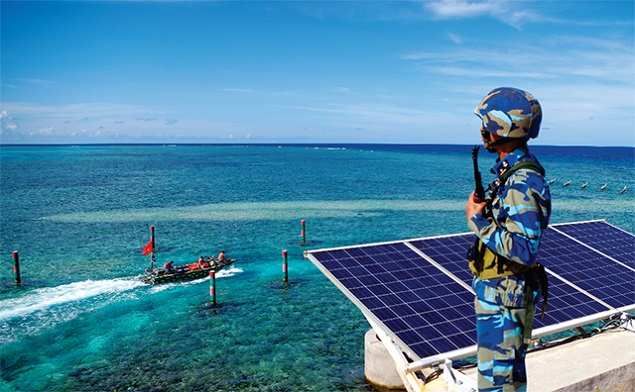
Who is the bully? China’s aggressive tactics in South China Sea in the midst of Covid-19 is poor form
Latest
| TIN LIÊN QUAN | |
| US security advisor criticises China’s acts in East Sea | |
| Carl Thayer: China intentionally violated international law | |
 |
It will be recalled that China claims most of the South China Sea and the various physical land formations contained therein on the basis of its own interpretation of history. There are competing claims to these waterways and islets by countries such as Vietnam, the Philippines, Malaysia and Brunei. In 2016, a Permanent Court of Arbitration ruling stated that China had no historical rights over the South China Sea on the basis of its so-called Nine-dash line maritime claim.
Yet, not only has China rejected that ruling but has also continued to flex its muscle in the South China Sea. It has deliberately expanded physical features that were previously categorised as rocks and semi-submerged shoals, created artificial islands, and even put down military assets in several of the islands in the region. If that weren’t enough, China has been violating the exclusive economic zones and maritime waters of neighbouring countries — over which there is complete clarity in law — by carrying out illegal ingresses with its ships. Last year, Chinese survey vessel Haiyang Dizhi 8 accompanied by several Chinese fishing and coast guard boats not only entered waters within Vietnam’s exclusive economic zone but also harassed operations at a Vietnamese oil and gas block which has Indian stakes.
The same Haiyang Dizhi 8 has now ingressed Malaysian waters, breaching Kuala Lumpur’s exclusive economic zone. It has been tagging a Malaysian drillship called West Capella. The standoff has forced the US to now dispatch an amphibious assault ship, USS America, to support the Capella. Before that on April 2, a Chinese coast guard vessel rammed and sunk a Vietnamese fishing boat near the disputed Paracel Islands. In fact, even the Philippines — a rival claimant in the South China Sea — expressed solidarity with Vietnam on the sinking incident. It will also be recalled that last year it was Manila that was at the receiving end of Beijing’s hostile behaviour when a Chinese vessel sank a Filipino fishing boat with 22 fishermen.
In fact, earlier this year even Indonesia had to aggressively counter the presence of Chinese coast guard and fishing vessels in its exclusive economic zone. Exasperated by such aggressive Chinese tactics, Vietnam this month sent a diplomatic protest note to the UN over China’s illegal claims in the South China Sea. Thus, things have come to a point where China is rubbing all its maritime neighbours the wrong way. And all of this comes at a time when everyone is trying to control the Covid-19 pandemic. China in recent weeks has been trying to position itself as a facilitator of international cooperation on Covid-19 by sending medical equipment to various countries, including those in Southeast Asia. But its actions in the South China Sea seem to suggest that it is using the pandemic to push its unilateral maritime claims in the region.
Of course, Beijing says this is not true and its operations in the South China Sea are part of its normal activities. But how is ramming boats of other countries and undertaking aggressive manoeuvres in the exclusive economic zones of neighbouring nations conducive to fostering the international cooperation that is needed to defeat the pandemic? And what further raises suspicion of Chinese motives here is Beijing’s recent establishment of two districts under Sansha City, Hainan province, to govern the Paracel Islands and the Spratly Islands. Again, this is a unilateral move by Beijing and undermines regional stability.
Given the way China is proceeding, it is clear that it wants to impose its will over the South China Sea no matter what. It seems unconcerned that countries in the region are fighting the Covid-19 pandemic and is willing to continue its aggressive tactics regardless. It has put forward unfair conditions during the negotiations for a code of conduct in the South China Sea, like no resource development with countries outside the region. And it has put together a formidable fishing militia to push its claims in the region’s waterways.
China often accuses the US of bullying tactics. But it appears to be adopting similar measures vis-a-vis the South China Sea. In that sense, Beijing risks treading the same path of superpower arrogance that Washington has walked before. And all of this in the middle of the Covid-19 pandemic makes China come across as an opportunistic, expansionist power. This distrust is precisely the reason why India recently enacted rules to bar foreign direct investment from China through the automatic route. And if China continues on its belligerent path in the South China Sea at this time of crisis, it cannot but expect aggressive reactions from its regional neighbours. Fishing in troubled waters certainly won’t go down well in today’s climate.
If all of this is not true, then China should reverse its approach to the South China Sea, set aside sovereignty claims, adopt a consultative framework and work with all stakeholders in the region to foster development and prosperity for all. If China wants to be a regional role model, it must walk the talk on genuine intra-regional and international cooperation in the South China Sea. Otherwise, it will be accused of bullying and rank opportunism.
* Author is a Delhi-based journalist working for the Edit Page of The Times of India.
(The views expressed are personal)

| Is China planning something in South China Sea? Vietnam's Foreign Ministry spokesperson said in her statement that the establishment of the so-called Sansha City and related activities seriously violated Vietnam's sovereignty. |

| US senators oppose China’s actions in South China Sea Four US senators opposed China’s actions in the South China Sea on Twitter |

| India's vision of Indo - Pacific: Concept and Structure The term ‘Indo-Pacific’ is being used increasingly in the global strategic/ geo-political discourse in recent years. The World and Vietnam Report kindly to introduce an ... |

















